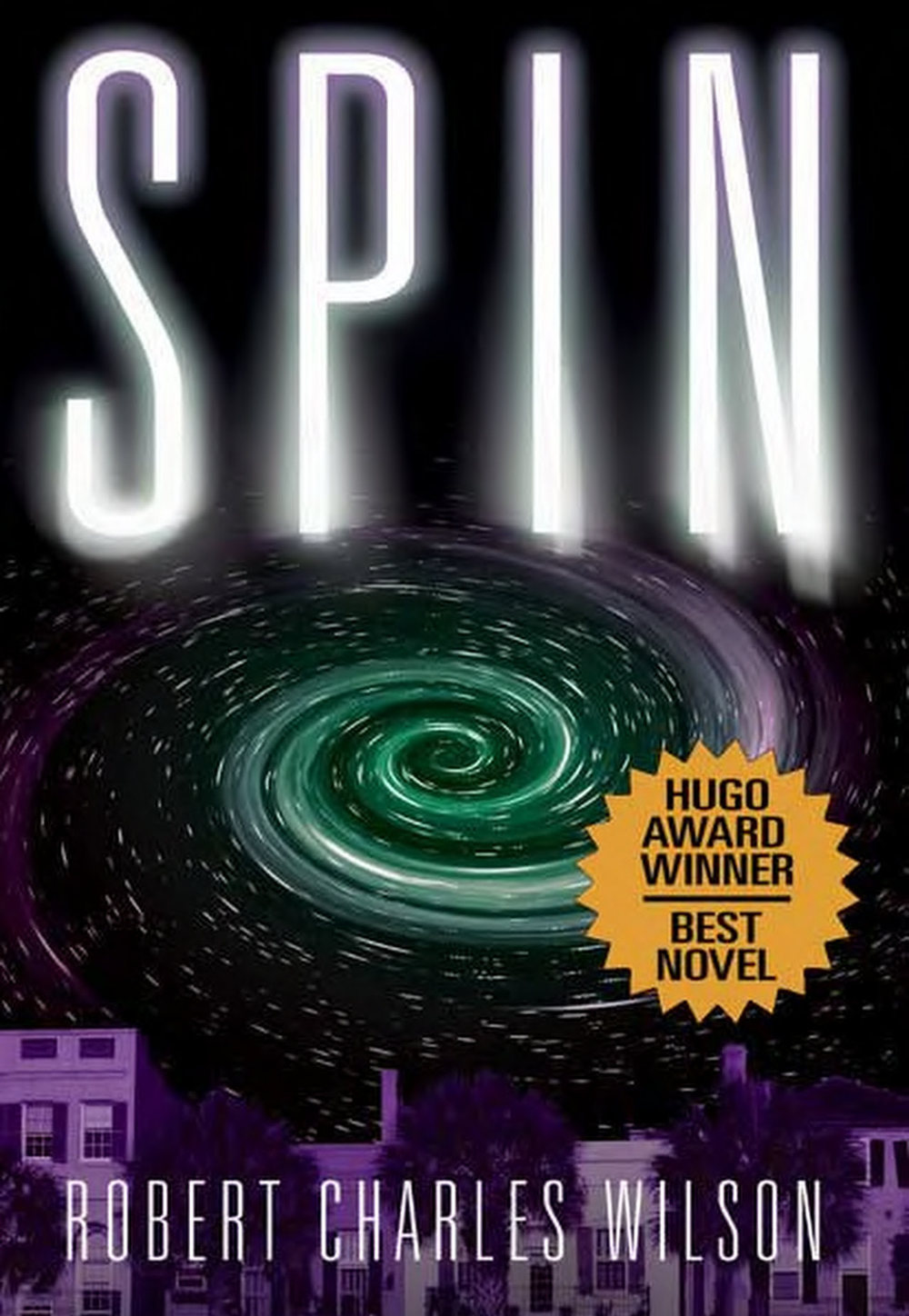
Spin
By Robert Charles
Published 2015 by Tor Books
ISBN 0-7653-0938-6
2006 Hugo Award for Best Novel
The sheep.horse Award for Good Novel with Shitty Cover Art, 2018
It wasn’t much.
People often say that, people who saw it happen. It wasn’t much. It really wasn’t, and I speak as a witness: I had been watching the sky while Diane and Jason bickered. There was nothing but a moment of odd glare that left an afterimage of the stars imprinted on my eyes in cool green phosphorescence. I blinked. Jason said, “What was that? Lightning?” And Diane said nothing at all.
Tyler was 12 when the stars vanished. This worldwide calamity at first causes widespread panic but things settle down and life initially continues pretty much as before once humanity gets used to the idea of an unknowable alien force surrounding the Earth with an opaque barrier. As the decades roll on, Tyler is in a unique position to witness events due to being lifelong friends with Jason Lawton, a brilliant scientist at the focus of the USA's attempt to make sense of the problem, and Jason's twin Diane, who joins one of many cults that spring up in the wake of the shrouding.
One way to judge a work of science fiction is to imagine what it would be like if edited to remove all the scifi elements. In this regard, Spin holds up remarkably well. Although the Spin is the central object that drives the plot forward the novel is really centered on the relationships between the protagonist and the Lawton family. If you removed the Spin from Spin you would end up with a perfectly serviceable if very dull novel about interdependent people and family secrets.
But Spin does contain all sorts of scifi goodies from the alien force field to the slightly dystopian society caused by the sky suddenly being different. Apart from the Spin itself, nothing in the book seems too outlandish to me - the steps taken to understand and possibly defeat the Spin are sensible and technically feasible. Likewise, the partial breakdown of law and order, and the raise of religious groups also seems believable.
Tyler, the protagonist, is yet another sad-sack white guy beloved by sad-sack white guy scifi authors everywhere. As a sad-sack white guy reader, I found I could identify with him but Tyler protags a frustratingly small amount for the POV character, existing mainly to be a dreary Watson to Jason's Sherlock. The event's in the novel hardly touch him, as a privileged professional he is mostly sheltered from what is going on around him. Only near the end does he finally make some engaging choices.
Speaking of choices, Dianne spends the novel making terrible decisions but I really liked her story. Joining successive cults probably makes more sense when the sun vanishes, the Spin is so awe-inspiring that ascribing it to God as part of His plan makes a certain amount of sense. I was amused by the progression from hippy sex-cult to boring corner church to isolationism as the raptureless years passed - most religions take hundreds of years to make the same metamorphosis but then they don't have direct proof of devine power hanging overhead.
So Spin is awesome, right? Yes, apart from the last quarter, which I will now spoil. Jason eventually makes contact with the aliens who constructed the Spin and basically spends a couple of pages plot-dumping the whole backstory. This strikes me as a lazy way to resolve the plot - a Deus Ex Nanomachana instead of having the characters gradually discover things for themselves. Possibly this is deliberate given the novel's themes but it makes for an unsatisfying reveal after such a great build up.
This demarcation between science (Jason) and religion (Dianne) is rather on-the-nose but it works well in the context of the story. It turns out that the Spin was constructed by a benevolent higher power to save humanity, the ineffable plan just took a lot longer than people expected to come to fruition. So Dianne and the cults were more or less right after-all.
Despite the weak ending, I would still recommend Spin. It is a nice mix of hard, near future scifi and literary novel.